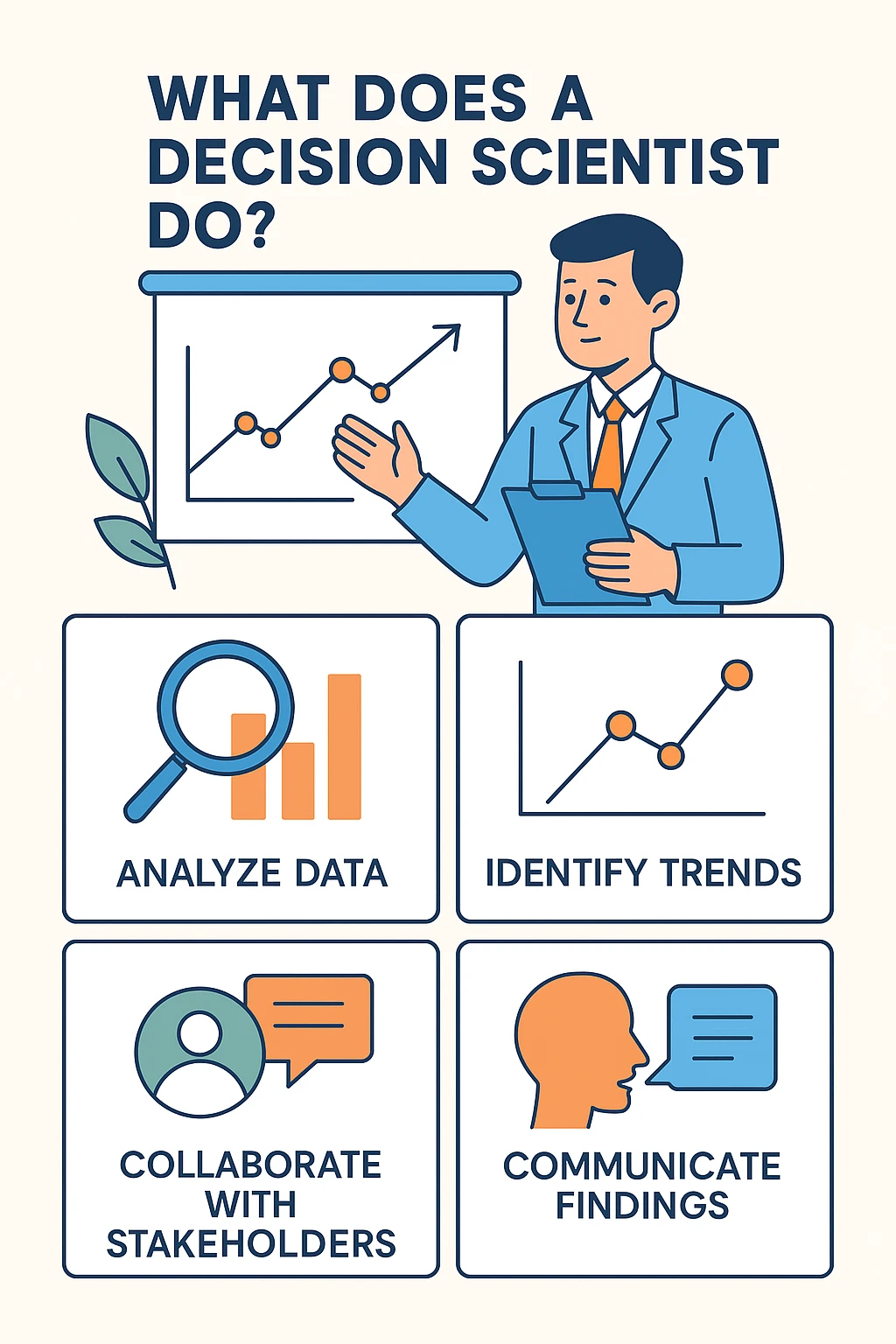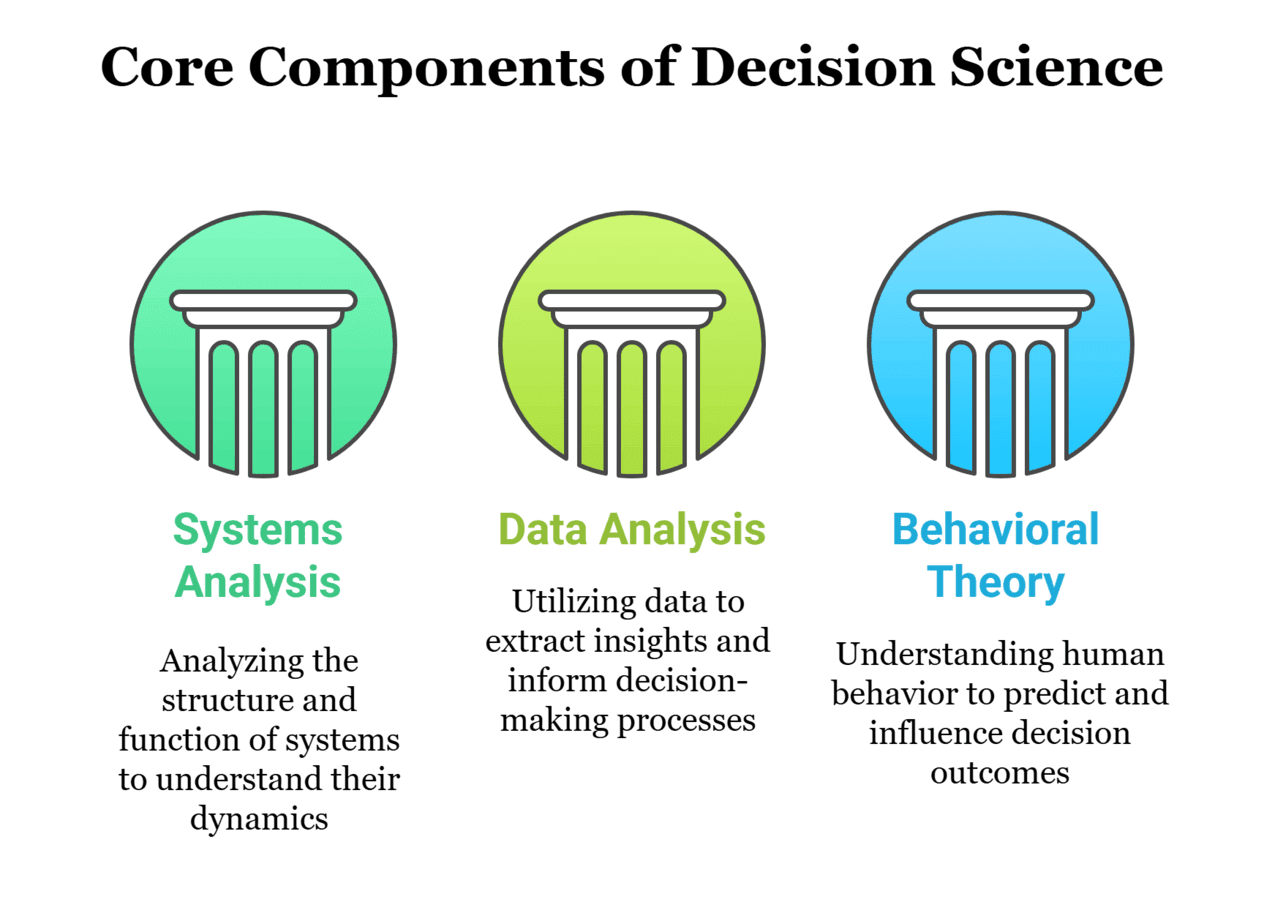What is Decision Science? A Complete Guide
Table of Contents

- jaro Education
- 2, July 2024
- 9:00 pm
Have you ever thought about how a huge corporation such as Amazon can figure out what item to suggest next, or how emergency cases in a hospital are prioritized? These are not mere guesses but well-calculated choices made by Decision Science. And the question arises, what is Decision Science? It is an interdisciplinary field between data science, psychology, economics, and statistics that studies how people and organizations make decisions. Essentially, it will aid people to make more intelligent choices through data analysis and learning how to behave.
Decision science provides a way of making better decisions, whether you are a business executive attempting to estimate sales, a policymaker considering alternative courses of action about public health strategies, or anything in between. In this blog, you will be guided through what decision science is in MBA?
What Does a Decision Scientist Do?

A decision science analyst integrates data with business context and thereby makes recommendations on what one or what business should do to make good choices. They analyze complex information, report main trends, as well as collaborate closely with stakeholders in order to give advice regarding the most effective course of action to achieve organizational objectives.
The main competencies, which a decision science analyst should possess, are a high level of analytical skills, a good grounding in statistics, knowledge of working with various tools of analysis, and an understanding of how to use AI in decision making. Also, they should have strong communication skills in order to present their findings and suggestions to other stakeholders who are not from a data specialist culture, to make sure that the data-driven solutions are received and managed.
What are the Components of Decision Science?
Since decision science is an amalgamation of various methodologies and disciplines emerging from various courses, it is crucial to understand the core components that are responsible for the creation of decision science.

- Analyzing the systems
Making decisions frequently entails navigating intricate networks of interrelated parts. Systems analysis examines the interconnections, behavior, and structure of complex systems to comprehend them. Decision scientists can use it to determine a system’s fundamental dynamics and how modifications made to one part of the system might impact the whole.
- Analyzing the data in decision science
A big part of decision science involves analyzing data. Analyzing data is quite useful as it helps to find pertinent patterns and trends by gathering and organizing the data. The analyzed data helps decision scientists make well-informed decisions based on facts and gain insights into elements that may impact the business’s daily operations.
- Behavioral decision theory
Although analyzing the data may offer a numerical method for making decisions, behavioral decision theory concentrates on comprehending the mental and emotional aspects that have an impact on the decision-making process of an individual. It investigates how people view risks, form opinions and assess results. Decision scientists can create strategies that are in line with people’s thought processes and decision-making styles by taking human behavior into account when making decisions. This information can raise the possibility of reaching desired results and enhance the efficacy of decision-making processes.
Career Opportunities in Decision Science
Decision Science is among the field that holds the best future due to the surge in data and the subsequent rise in the need to make intelligent, data-informed choices. You can be a student of technology and have a career in this vibrant sector, be a business student, or even a psychology student, you have a role to play in this field.
These are some of the best career opportunities in Decision science:
Job Role | What You Do | Skills Needed | Average Salary (India) |
Data Scientist | Analyze complex data to help businesses make informed decisions | Python, SQL, ML, Statistics | ₹10–20 LPA |
Decision Analyst | Use models and analytics to guide strategic business decisions | Excel, Data Modelling, Decision Trees | ₹6–12 LPA |
Business Analyst | Translate data insights into business strategies | BI Tools, Communication, Analytics | ₹5–10 LPA |
Operations Research Analyst | Optimize processes using mathematical models | Linear Programming, Optimization Tools | ₹7–14 LPA |
Product Analyst | Use data to improve product performance and user experience | A/B Testing, Product Metrics | ₹6–12 LPA |
Risk Analyst | Assess financial or operational risks and recommend solutions | Risk Modeling, Probability, Tools like SAS | ₹6–11 LPA |
Marketing Analyst | Help brands make data-driven marketing decisions | Consumer Data, Market Research, Data Viz | ₹5–10 LPA |
AI/ML Engineer (Decision-Focused) | Build AI systems to automate decision-making | ML Algorithms, Deep Learning | ₹12–25 LPA |
Source: Glassdoor
These roles are found in companies like:
- Amazon
- Deloitte
- McKinsey
- Accenture
- Flipkart
- Zomato
And not just in tech—decision science is now essential in healthcare, education, manufacturing, banking, and government.
Decision Science Certificate: Quick Entry Into the Field
Not ready for a full-time degree? A Decision Science Certificate might be the perfect starting point.
What is a Decision Science Certificate?
It’s a short-term course (usually 3 to 6 months) that introduces you to the core concepts of decision science. You’ll learn:
- Data analysis and visualization
- Business intelligence tools
- Basic machine learning
- Behavioral economics
- Real-world case studies
Who Should Take It?
- Working professionals looking to upskill
- Students from engineering, business, or science backgrounds
- Entrepreneurs who want data-backed decision-making skills
Benefits of a Certificate Program:
- Quick and flexible learning
- Often available online
- Adds weight to your resume
- Affordable compared to full degrees
Many top institutions, like IIMs, offer the decision science certificate programs.
Why You Should Learn Decision Science in 2025?
Putting career upgrading in 2025 on your mind? Decision Science is the one to choose first! In the modern environment, companies are overwhelmed by data, yet not all people are aware of converting that information into intelligent and profitable decisions. That is where decision science enters. It combines information analysis, the science of behavior and technology to address the real world issues. Then, no matter what you want to do with your career, whether it is business, technology, health, or even public policy, learning decision science will enable you to make better, quicker, and more strategic decisions, which is a skill that is needed most currently.
From Where You Can Do Decision Science MBA
Symbiosis School for Online and Digital Learning (SSODL) brings up Online MBA Degree Programe through which one can be able to fuse thinking in a corporate world with contemporary innovativeness, aimed to become a best corporate achiever. The programme will enable the learners to prepare themselves with skills and knowledge that are essential to become a modern and effective leader in the present-day business world, which is changing at a very fast rate. Be educated in a well-known institution with the purpose of building the knowledge that will set the professionals apart in the global times of complexity. The curriculum has been designed by the top B-School faculty of Symbiosis and delivered by well-qualified faculty and faculty deliverables in the B-School so that the most quality education gets delivered to the students. The specializations cover Marketing, HR, Finance, Operations, Business Analytics, International Business, Hospital and Health Care Management, Agri Operations Management, Logistics, and Supply Chain Management. Carry your career development, obtain the knowledge and skills that top institutions require in the current job market and be in a position to fulfill your career dreams.
Unlock the Career With Jaro Education
Jaro Education is now a recognized brand when it comes to career-oriented higher education and has played a pivotal role in the upskilling of professionals and students as well as helped them to change their careers by assisting in more than 3 lakh people. Having a success percentage of more than 85 in career-hopping, Jaro collaborates with leading-rated universities such as IIMs, IITs, International B-schools to provide industry-relevant online courses. As much as you want to be promoted, change your career or start a business or enterprise of your own, Jaro Education will provide you with the knowledge, credential, and network right to open your professional possibilities.
Frequently Asked Questions
Decision Science is an interdisciplinary field that combines data analysis, statistics, behavioral science, and business strategy to help organizations make smarter, data-driven decisions.
While both fields use data, Decision Science focuses on applying data insights to business decision-making, often incorporating psychology and strategic thinking, whereas Data Science leans more on algorithms and technical modeling.
Anyone with a background in engineering, business, mathematics, economics, or computer science can pursue Decision Science. Professionals from non-technical fields can also transition into it through certificate courses or an MBA in Decision Science.
A Decision Scientist analyzes data, builds models, and provides recommendations to solve complex problems in areas like marketing, supply chain, finance, and product development.
Basic coding knowledge in tools like Python, R, or SQL is helpful, but not mandatory. The focus is more on problem-solving, logical reasoning, and business understanding.









